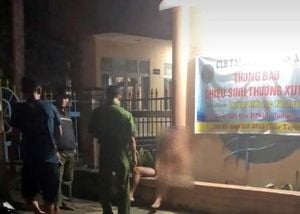Thousands of Slovaks took to the streets this past weekend to voice their discontent with Prime Minister Robert Fico, rejecting his government's pro-Russia stance and demanding his resignation. The protests, considered the largest since Fico returned to power last year, saw approximately 60,000 demonstrators gather in the capital of Bratislava, with reports indicating even higher numbers—around 100,000—across various cities.
Fico, who has been under scrutiny since his clandestine meeting with Russian President Vladimir Putin last December, firmly dismissed calls for his dismissal. "The government cannot be changed without elections," Fico stated during his interview with public television.
The protests erupted following Fico's controversial visit to Moscow, which many activists interpreted as undermining Slovak connections with the European Union and NATO. His left-wing nationalist administration has been accused of sabotaging democratic principles and veering toward Russia amid heightened tensions from the Ukraine invasion.
Organized by the group Mier Ukrajine (Peace for Ukraine), the protests featured the slogan "We Are Europe" and signaled growing public dissatisfaction with Fico's foreign policy direction. Protesters criticize the government for its alleged concessions to Russian interests at the expense of Slovakia's allegiance to Western allies.
Political unrest looms for Fico and his fragile coalition government, which has experienced internal instability. A minor coalition party recently expelled two members, illustrating potential cracks within Fico's alliance—a coalition made up of the Hlas, Smer, and Slovak National parties, which managed to gain 79 seats out of 150 during the last election.
Many demonstrators recall the protests of 2018 when the assassination of investigative journalist Ján Kuciak led to widespread unrest and Fico's resignation. The latest demonstrations facilitate comparisons to those turbulent times as citizens express growing fears over threats to democracy.
Despite the unrest, Robert Fico defended his administration's foreign policy, asserting his government sought amicable relations with all parties involved. While he criticized certain EU policies, he remained committed to the Slovak Republic's obligations to NATO.
Fico's rhetoric has included unfounded allegations about the motivations behind the demonstrations, asserting the existence of unidentified foreign experts allegedly involved with the protests, similar to those seen against pro-Russian leadership abroad. He even mentioned plans to compile lists of individuals to be expelled from Slovakia based on these claims.
The political climate is expected to intensify as opposition parties prepare to challenge Fico's leadership. A significant test for the government's stability will occur next week during discussions surrounding a proposed vote of no confidence, provoking anticipation over whether Fico can maintain his grip on power.



